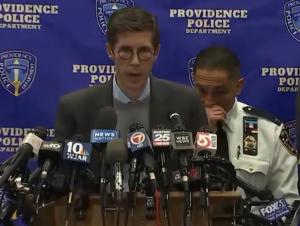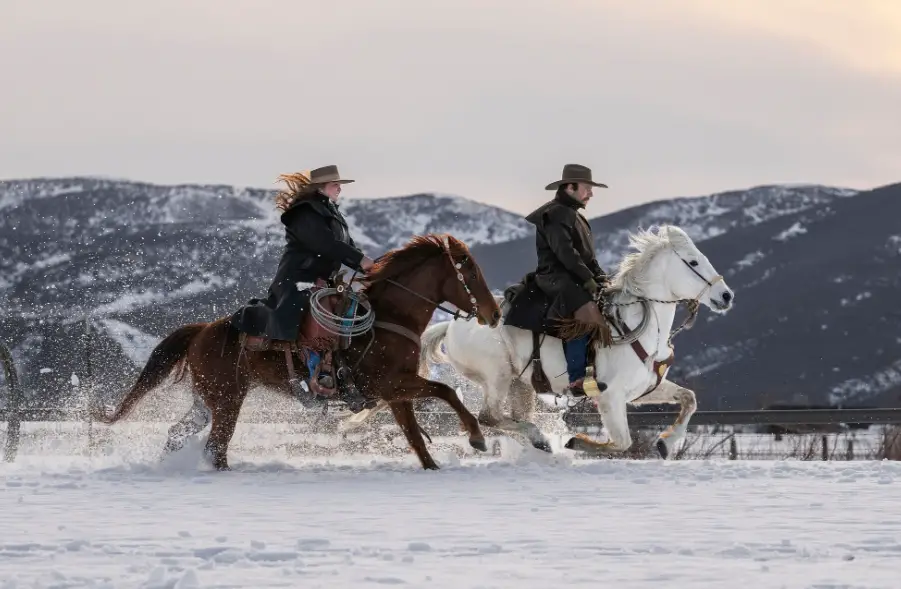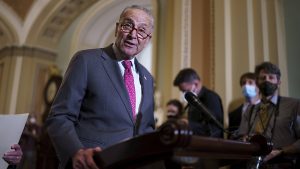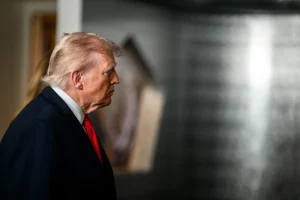A War Veteran Found a Wild Mustang Trapped in Fire — What Happened Next Will Move You to Tears
The last days of October came early to Red Valley. A brittle gray sky pressed low across the Wyoming horizon, heavy with the weight of a season not yet winter, but no longer autumn, either. The kind of sky that seemed to hold its breath waiting.
The air cut sharper than a knife, its chill carrying down from the high ridges where the red sandstone cliffs rose like the bones of the earth itself. Those cliffs, weathered by centuries of wind, stood in a haze of pale mist—outlines blurred, but unmistakably vast.
This was Red Valley in late October. Vast, windswept, stripped down to silence. The land did not welcome or comfort. It endured. And in that endurance, it reflected the man who lived within it.
His name was Jack Ror, and he was about to discover that sometimes salvation comes on four legs, through smoke and flame, when you least expect it.
The Soldier Who Came Home But Never Left the War
Jack Ror was forty-five years old. Once he had stood tall, broad-shouldered and unyielding—a figure built to carry heavy packs across foreign deserts, to climb mountains with gear clanking against his back, to kick in doors where the unknown waited.
Now his frame still carried that stubborn strength, but his back had bent ever so slightly, as though pressed down by years of invisible weight. He dressed the way the valley itself looked—worn, practical, stripped of anything unnecessary: a canvas jacket with frayed, weather-stained shoulders; faded jeans that had seen more winters than he cared to count; leather boots with heels chewed by time.
His face was harder to ignore. The high cheekbones and square jaw that once marked him as young had thinned into sharp edges. Stubble peppered with gray framed a mouth usually pressed into silence. But it was his eyes that unsettled people most—a gray so dull it seemed clouded. Always watching, always cautious. Those eyes rarely softened, even in the company of strangers.
Afghanistan had been another kind of red valley—different soil, different sun, but the same cruel vastness. Jack had served there through multiple tours, moving through villages scorched by conflict, mountains littered with dust and broken promises. He had seen ambushes where men vanished in smoke, firefights that dragged on until the barrel of his rifle seared his hands, and the kind of silence that followed death too closely.
The war had not left him when the orders did.
The Memory That Haunted Every Night
At night, he would jolt awake, lungs straining for air as if the desert still choked him. His shirt clung to his skin with cold sweat. Sometimes it was a noise that brought him out of sleep—the slam of a shutter in the wind, thunder rolling down from the ridges, the crack of wood in the fire.
In an instant, those sounds transformed: a door became a gunshot; thunder became mortars; crackling fire became the sound of rounds striking stone. He slept with his back to the wall always—even in his own bed inside a valley where no enemy waited.
But it wasn’t the noises or the sweat that scarred him deepest. It was a memory. Marcus Hail.
Marcus had been more than a squadmate. He was the kind of man who carried others forward when their legs gave out, who cracked jokes with dust in his teeth, who could take the worst day and convince you tomorrow still mattered. In Afghanistan, he was Jack’s anchor.
And in one brutal ambush, Jack lost him.
The memory returned in fragments: the canyon road swallowed in smoke; the staccato of automatic fire hammering stone; Marcus shouting for him to move; then the sudden collapse—Marcus falling. The sound was muffled by chaos, his body crumpling into the dust.
Jack lunged toward him, but it was too late. By the time the firing ceased, Marcus lay still, eyes fixed on nothing. That image replayed endlessly, the guilt carved deep. If I had been faster. If I had been closer. If I had done something different. Maybe he’d still be here.
The Life That Became Survival
Jack carried that weight as surely as he carried his scars—a wound no bandage could ever close. So he chose silence. After the war, when the medals were pinned and the hands were shaken, Jack walked away.
His wife, weary of his absence even when he was home, eventually left. They had no children. His friends—those who had once crowded bars and campfires—drifted off to their own fractured lives. The bonds of war that had once tied them together stretched thin with distance until they disappeared altogether.
He returned to Red Valley, not for its beauty, but for its emptiness. Here, no one expected him to talk. No one asked him how he was sleeping or why he never smiled. Here, the silence of the cliffs mirrored the silence inside him.
His days became rituals without meaning. Wake at dawn. Chop wood, even if there was already enough stacked by the wall. Fix fence posts that would likely break again in the next storm. Heat beans in a skillet. Boil coffee black as tar. Walk the ridges, the forest, the creek side—not searching, only moving as though motion itself kept the shadows at bay.
The house remained quiet. The only sound inside was the tick of an old clock, each second thudding louder than it should, measuring not progress, but the slow weight of time. He spoke rarely. Some weeks passed without a single word escaping his lips.
It was survival, nothing more. If anyone had asked him what he lived for, Jack Ror would not have known how to answer.
The Morning That Changed Everything
Morning broke without light in Red Valley. The sky was a quilt of low gray cloud stitched tight over the ridges. The wind worried the pines and slid like a cold blade along the limestone creek that threaded the trees.
Jack followed the water as he always did when sleep had refused him, hands deep in his canvas jacket, boots finding the narrow cuts between roots and stones by memory. It was a path he’d worn out of habit and need—a route that walked the noise down to a murmur.
He had come out here to shake off the night, to outrun the blast that had ripped through his dream and pulled Marcus away again. He told himself the air would rub the smoke from his lungs, that the gray would thin with the morning.
It didn’t.
Then he smelled it. Smoke—not the phantom smoke of his nightmares, but real smoke, sharp and acrid on the wind. His head snapped up, every nerve suddenly alive. In the distance, beyond the tree line, a column of black smoke twisted into the gray sky.
Wildfire.
Jack’s training kicked in immediately. He ran back to the house, grabbed his truck keys, and drove toward the smoke. The radio crackled with emergency broadcasts—a lightning strike had ignited dry grass in the upper valley. Fire crews were responding, but the wind was pushing the flames fast through the drought-brittle vegetation.
The Discovery That Would Change Two Lives
As Jack crested a ridge, he saw the fire line—a wall of orange and red consuming everything in its path. The heat hit him like a physical force, even from a quarter-mile away. And then he saw something that made his blood freeze.
In a box canyon, cut off by flames on three sides, stood a lone horse.
Not just any horse—a wild mustang, black as midnight, magnificent and terrified. The stallion reared and wheeled, looking for escape that didn’t exist. The fire was closing in fast, and the horse was trapped.
Jack didn’t think. He grabbed a rope from his truck bed and started running toward the canyon. The heat grew intense, the smoke thick enough to choke on. Every instinct told him to turn back, to save himself. But something deeper—something that had been sleeping since Marcus died—suddenly roared to life.
He wasn’t going to lose another life. Not today. Not if he could help it.
The horse saw him coming and panicked, rearing and striking. Jack moved slowly, speaking in low, calm tones despite the approaching flames. “Easy, boy. I’m not here to hurt you. I’m here to help.”
The stallion’s eyes were wild with terror, white showing all around the dark irises. Foam flecked his muzzle. But something in Jack’s voice, some quality of desperation mixed with determination, seemed to reach him.
The Rescue That Saved Them Both
The fire was less than a hundred yards away when Jack finally got close enough to the horse. He could feel the heat scorching his back, hear the roar of flames consuming the dry grass and sagebrush. Smoke burned his lungs and stung his eyes.
“Come on,” he whispered to the horse. “Trust me. Please.”
The stallion stood trembling, caught between the advancing fire and this strange human who spoke with such quiet urgency. Jack slowly extended his hand, letting the horse catch his scent. For a moment that lasted forever, they looked into each other’s eyes—two beings trapped by forces beyond their control, with only each other to depend on.
Then the horse stepped forward.
Jack slipped the rope around the stallion’s neck, not as a capture device but as a lifeline. Together, they ran. Through smoke so thick Jack could barely see his own feet, through heat that felt like walking into an oven, they ran for the gap in the canyon wall—the only path not yet consumed by flames.
They made it with seconds to spare. Behind them, the fire swept through the canyon like a hungry beast, consuming everything in its path. They stood on safe ground, both of them breathing hard, both of them alive.
Jack looked at the horse—really looked at him for the first time. The stallion was magnificent. Even singed and traumatized, he was beautiful beyond words. His coat was black as a moonless night, his mane wild and free. His eyes, no longer white with terror, were deep and intelligent.
“Easy, boy,” Jack said again, his own hands shaking now that the adrenaline was fading. “We made it. We’re safe.”
The Bond That Formed in Fire
In the days that followed, Jack couldn’t stop thinking about the horse. He’d reported the rescue to the Bureau of Land Management, expecting them to come collect the mustang and relocate him to a sanctuary or adoption facility.
Instead, he got a call that changed everything.
“Mr. Ror? This is Susan Martinez from BLM. About that stallion you rescued—we’ve been tracking him for years. He’s what we call a ‘problem horse.’ He’s attacked three different people who tried to approach him, injured two BLM contractors, and escaped from two different holding facilities.”
Jack frowned. “That doesn’t sound like the horse I met.”
“Well, here’s the thing. Because of his history, he’s scheduled for euthanasia. Unless… would you be interested in taking him? We have a program for experienced handlers willing to work with difficult animals.”
Jack didn’t hesitate. “Yes.”
“Mr. Ror, I should warn you—this animal is considered dangerous. He’s never been successfully gentled. He’s injured—”
“I’ll take him,” Jack interrupted. “When can I pick him up?”
There was a pause. “Are you sure about this? He’s not a pet. He’s a wild animal with a history of violence.”
Jack thought about those moments in the canyon, the way the horse had trusted him when everything else was chaos and death. “He saved my life as much as I saved his. I’m sure.”
The Healing That Happened Slowly
Jack named him Midnight, and brought him to a temporary corral he built behind his house. The veterinarian who examined him found minor burns and smoke inhalation, but nothing that wouldn’t heal with time and care.
What took longer to heal were the invisible wounds—the fear, the trauma, the learned distrust of humans. Jack understood those wounds intimately.
For weeks, Midnight would barely let Jack near him. He’d accept food and water, but any attempt to touch him resulted in rearing, striking, and frantic attempts to escape. A lesser man might have given up, might have admitted the experts were right.
But Jack had been broken too. He recognized the signs—the hypervigilance, the startled reactions to sudden sounds, the inability to relax even in safety. He’d seen it in his mirror every morning for years.
So he did something revolutionary: he stopped trying to fix Midnight, and started simply being present with him.
Every morning, Jack would sit on the fence rail with his coffee and just exist in the horse’s space. He didn’t demand anything, didn’t try to touch or train or tame. He just sat there, a calm presence in Midnight’s world.
Slowly—so slowly Jack sometimes wondered if he was imagining it—the horse began to relax. The frantic pacing stopped. The constant vigilance eased. One morning, Jack found Midnight grazing peacefully near the fence where he sat.
The Breakthrough That Changed Everything
The real breakthrough came six weeks after the rescue. Jack was sitting on his usual spot on the fence, writing in an old leather journal—something his therapist had suggested years ago but he’d never tried. He was writing about Midnight, about the fire, about how strange it felt to care about something again.
As he wrote, he became aware of warm breath on his shoulder. He looked up slowly, afraid to spook the horse, and found Midnight standing right beside him. The stallion’s great head was stretched over the fence, close enough that Jack could see the individual whiskers on his muzzle.
For a long moment, neither moved. Then Jack slowly reached out and placed his palm against the horse’s cheek. Midnight didn’t flinch. He leaned into the touch, his eyes half-closing in what looked like contentment.
“Hello, boy,” Jack whispered. “I’ve missed you too.”
That night, for the first time since Afghanistan, Jack slept through until dawn. No nightmares. No cold sweats. No jolting awake with his heart pounding. Just deep, peaceful sleep.
He woke to find Midnight standing at the fence nearest the house, as if keeping watch.
The Journey to Healing
Over the following months, Jack and Midnight developed a routine that healed them both. Jack would start each day with the horse, grooming him, talking to him, sharing the quiet morning hours. Midnight learned to trust not just Jack’s hands, but his presence, his voice, his steady reliability.
In return, the horse gave Jack something he’d lost in the desert: purpose. Caring for Midnight meant Jack had to get up each morning, had to plan for the future, had to believe that tomorrow mattered. The horse needed him, depended on him, and that dependency gave Jack’s life meaning again.
They went on long rides through the valley, Midnight carrying Jack over trails he’d forgotten existed. The horse was magnificently sure-footed, intelligent, responsive to the slightest touch. More than that, he seemed to sense Jack’s moods, offering comfort when the dark days came and sharing joy in the small victories.
Jack started talking again—to Midnight at first, then gradually to other people. The local feed store owner. The veterinarian. Even, occasionally, to other veterans he met at the VA clinic.
The nightmares didn’t disappear, but they became less frequent. When they did come, Jack would walk out to the corral, and Midnight would be there, solid and real and alive. The horse’s breathing, the warmth of his body, the simple fact of his existence would ground Jack back in the present.
The Mission That Found Them
A year after the rescue, Jack received a call that would change both their lives again. It was from a veteran’s therapy program in Cheyenne—a pilot project using horses to help combat veterans with PTSD.
“We’ve heard about you and your mustang,” the program coordinator explained. “We have a lot of veterans who aren’t responding to traditional therapy. Some of them haven’t spoken in months. We think your horse might be able to help.”
Jack was skeptical. “Midnight’s not trained for therapy work. He’s still technically a wild horse.”
“Sometimes that’s exactly what broken people need—something that understands being broken.”
Jack looked out at Midnight, grazing peacefully in the morning sun. The horse had saved his life, had given him reason to live again. Maybe it was time to share that gift.
The Miracle That Multiplied
The first day at the veteran’s therapy ranch, Midnight caused quite a stir. Even the experienced horse handlers were nervous around the massive black stallion with his reputation for violence. But Jack had seen past the fear to the soul underneath, and gradually, others began to see it too.
The breakthrough came with Luke Jensen, a young Marine who hadn’t spoken a word since returning from his third tour in Afghanistan. Luke sat apart from the group, arms folded, jaw clenched, radiating the kind of rage and despair Jack recognized intimately.
Without any prompting from Jack, Midnight walked across the dusty arena and stopped directly in front of Luke. The horse lowered his great head and exhaled gently against the young man’s trembling hands.
Luke looked up into Midnight’s eyes, and something fundamental shifted. “I think I can breathe again,” he whispered—the first words he’d spoken in eight months.
The arena fell silent. Even the trainers stopped what they were doing to witness this moment of connection, this bridge built between two wounded souls.
The Legacy That Lives On
Word spread quickly through the veteran community. Here was a horse who understood trauma, who could reach the unreachable, who offered healing without judgment or expectation. Veterans began requesting sessions specifically with Midnight, and gradually, the program expanded.
Jack found himself traveling regularly to Cheyenne, bringing Midnight to work with groups of veterans who had given up on traditional therapy. The horse seemed to have an uncanny ability to identify the most wounded, the most lost, the most in need of connection.
Some veterans just needed to sit quietly beside him. Others found peace in grooming his coat or cleaning his hooves. A few, like Luke, discovered they could speak again when they whispered into his patient ear.
The program psychologists were amazed. “Do you know what you’ve brought here?” one of them asked Jack. “Sometimes it takes us years to help someone open up, to trust again. That horse of yours does it in minutes.”
Jack understood. Midnight had done the same for him.
The Transformation That Continues
Today, Jack and Midnight are fixtures at veteran therapy programs across Wyoming and Colorado. The horse who was once scheduled for euthanasia because he was “too dangerous” now helps dozens of veterans each year find their way back to life.
Jack’s own healing continues. The nightmares are rare now, and when they come, they’re manageable. He’s learned to talk about Marcus, about the guilt he carried, about the long journey back from the edge of despair. He’s even started writing—not just in his journal, but articles about veteran mental health, about the healing power of animals, about second chances.
Most importantly, he’s learned that sometimes salvation comes from the most unexpected places. A wild horse trapped in fire. A moment of desperate courage. A decision to trust when everything seemed hopeless.
The Truth About Healing
People often ask Jack what Midnight taught him about healing. The answer is complex but simple: healing doesn’t happen overnight, and it doesn’t happen alone.
“Midnight didn’t cure my PTSD,” Jack explains. “He gave me a reason to keep fighting it. He showed me that being broken doesn’t mean being worthless, that even the most damaged souls can find purpose and peace.”
The horse who was once labeled a monster became a miracle—not through force or training, but through patience, understanding, and mutual respect. He proved that healing happens when we stop trying to fix each other and start simply being present for each other.
The Fire That Started It All
On quiet evenings, Jack and Midnight still walk the trails of Red Valley. The scars from that long-ago fire have healed, new growth covering the burned ground. But Jack will never forget that morning when smoke on the horizon led him to the most important rescue of his life.
They called Midnight a monster. Jack calls him a miracle. The horse chose him, just as he chose the horse, in a moment when both of their lives hung in the balance.
Sometimes salvation really does come through fire, carrying us to safety on four legs and a heart big enough to heal the deepest wounds.
The valley endures, as it always has. But now it holds not just one man’s solitude, but the echoes of healing, the promise of hope, and the proof that even the wildest hearts can learn to trust again.
In the end, Jack didn’t just save a horse from fire. The horse saved him from something far more dangerous—the slow burn of despair that consumes from within. Together, they found their way back to life, one gentle breath at a time.

Emily Johnson is a critically acclaimed essayist and novelist known for her thought-provoking works centered on feminism, women’s rights, and modern relationships. Born and raised in Portland, Oregon, Emily grew up with a deep love of books, often spending her afternoons at her local library. She went on to study literature and gender studies at UCLA, where she became deeply involved in activism and began publishing essays in campus journals. Her debut essay collection, Voices Unbound, struck a chord with readers nationwide for its fearless exploration of gender dynamics, identity, and the challenges faced by women in contemporary society. Emily later transitioned into fiction, writing novels that balance compelling storytelling with social commentary. Her protagonists are often strong, multidimensional women navigating love, ambition, and the struggles of everyday life, making her a favorite among readers who crave authentic, relatable narratives. Critics praise her ability to merge personal intimacy with universal themes. Off the page, Emily is an advocate for women in publishing, leading workshops that encourage young female writers to embrace their voices. She lives in Seattle with her partner and two rescue cats, where she continues to write, teach, and inspire a new generation of storytellers.









